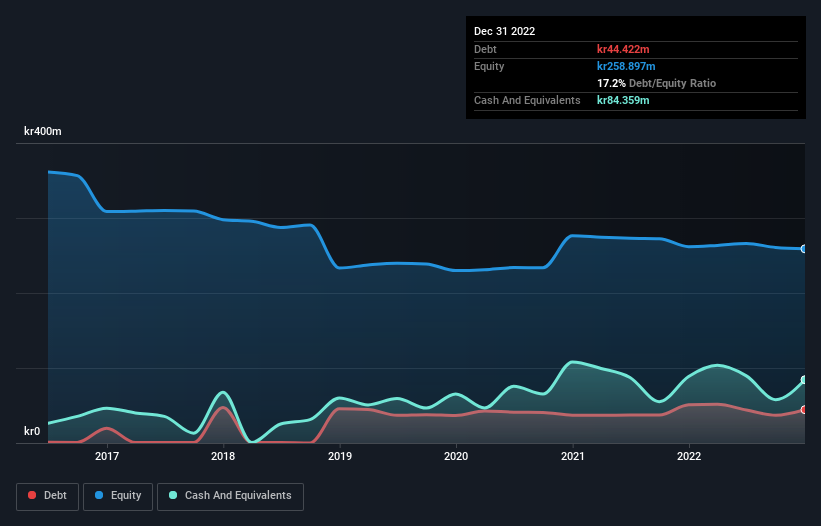The external fund manager backed by Berkshire Hathaway's Charlie Munger, Li Lu, makes no bones about it when he says 'The biggest investment risk is not the volatility of prices, but whether you will suffer a permanent loss of capital.' So it might be obvious that you need to consider debt, when you think about how risky any given stock is, because too much debt can sink a company. We can see that Goodtech ASA (OB:GOD) does use debt in its business. But should shareholders be worried about its use of debt?
Why Does Debt Bring Risk?
Generally speaking, debt only becomes a real problem when a company can't easily pay it off, either by raising capital or with its own cash flow. Part and parcel of capitalism is the process of 'creative destruction' where failed businesses are mercilessly liquidated by their bankers. However, a more usual (but still expensive) situation is where a company must dilute shareholders at a cheap share price simply to get debt under control. By replacing dilution, though, debt can be an extremely good tool for businesses that need capital to invest in growth at high rates of return. When we think about a company's use of debt, we first look at cash and debt together.
See our latest analysis for Goodtech
What Is Goodtech's Net Debt?
As you can see below, Goodtech had kr44.4m of debt at December 2022, down from kr50.9m a year prior. However, its balance sheet shows it holds kr84.4m in cash, so it actually has kr39.9m net cash.

How Healthy Is Goodtech's Balance Sheet?
Zooming in on the latest balance sheet data, we can see that Goodtech had liabilities of kr252.2m due within 12 months and liabilities of kr36.0m due beyond that. Offsetting these obligations, it had cash of kr84.4m as well as receivables valued at kr97.3m due within 12 months. So its liabilities outweigh the sum of its cash and (near-term) receivables by kr106.7m.
Goodtech has a market capitalization of kr248.5m, so it could very likely raise cash to ameliorate its balance sheet, if the need arose. But it's clear that we should definitely closely examine whether it can manage its debt without dilution. Despite its noteworthy liabilities, Goodtech boasts net cash, so it's fair to say it does not have a heavy debt load!
Notably, Goodtech made a loss at the EBIT level, last year, but improved that to positive EBIT of kr2.0m in the last twelve months. When analysing debt levels, the balance sheet is the obvious place to start. But it is future earnings, more than anything, that will determine Goodtech's ability to maintain a healthy balance sheet going forward. So if you're focused on the future you can check out this free report showing analyst profit forecasts.
Finally, a company can only pay off debt with cold hard cash, not accounting profits. Goodtech may have net cash on the balance sheet, but it is still interesting to look at how well the business converts its earnings before interest and tax (EBIT) to free cash flow, because that will influence both its need for, and its capacity to manage debt. Happily for any shareholders, Goodtech actually produced more free cash flow than EBIT over the last year. That sort of strong cash conversion gets us as excited as the crowd when the beat drops at a Daft Punk concert.
Summing Up
Although Goodtech's balance sheet isn't particularly strong, due to the total liabilities, it is clearly positive to see that it has net cash of kr39.9m. The cherry on top was that in converted 633% of that EBIT to free cash flow, bringing in kr13m. So we are not troubled with Goodtech's debt use. There's no doubt that we learn most about debt from the balance sheet. However, not all investment risk resides within the balance sheet - far from it. For example, we've discovered 1 warning sign for Goodtech that you should be aware of before investing here.
When all is said and done, sometimes its easier to focus on companies that don't even need debt. Readers can access a list of growth stocks with zero net debt 100% free, right now.
New: Manage All Your Stock Portfolios in One Place
We've created the ultimate portfolio companion for stock investors, and it's free.
• Connect an unlimited number of Portfolios and see your total in one currency
• Be alerted to new Warning Signs or Risks via email or mobile
• Track the Fair Value of your stocks
Have feedback on this article? Concerned about the content? Get in touch with us directly. Alternatively, email editorial-team (at) simplywallst.com.
This article by Simply Wall St is general in nature. We provide commentary based on historical data and analyst forecasts only using an unbiased methodology and our articles are not intended to be financial advice. It does not constitute a recommendation to buy or sell any stock, and does not take account of your objectives, or your financial situation. We aim to bring you long-term focused analysis driven by fundamental data. Note that our analysis may not factor in the latest price-sensitive company announcements or qualitative material. Simply Wall St has no position in any stocks mentioned.
About OB:GOD
Goodtech
Provides control systems, digitization, and production solutions for production companies in Norway, Sweden, Finland, Europe, and internationally.
Flawless balance sheet and good value.
Market Insights
Community Narratives



